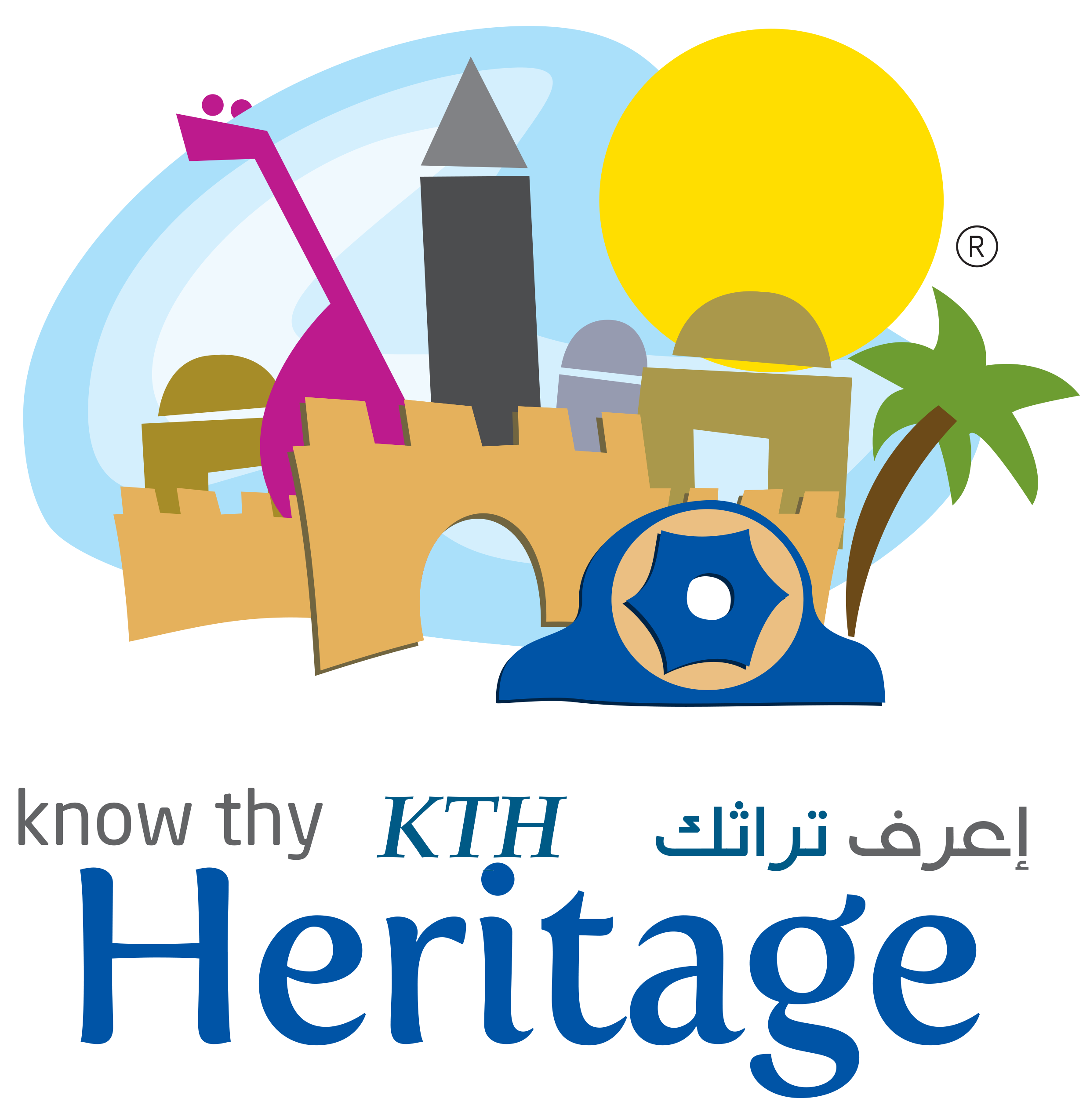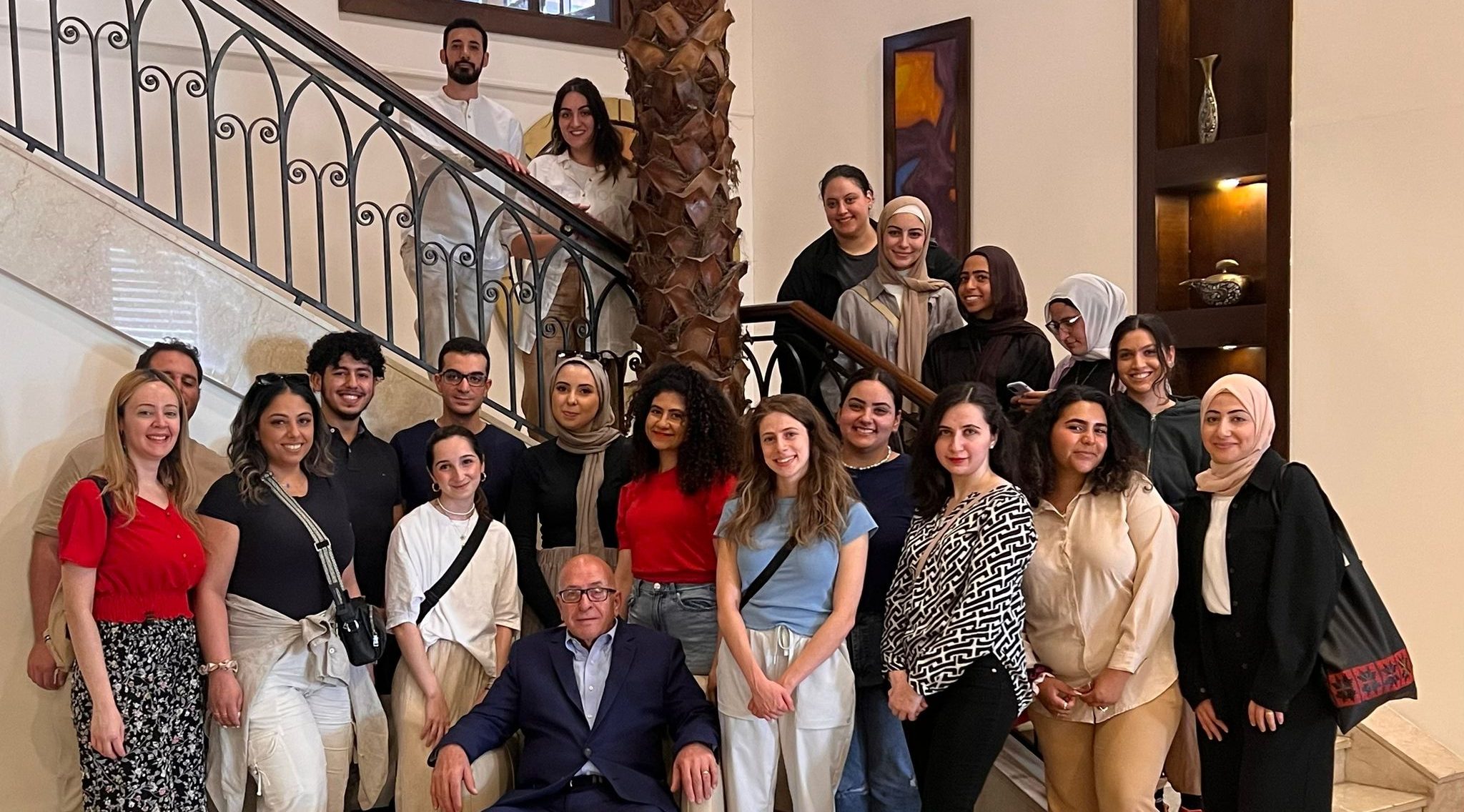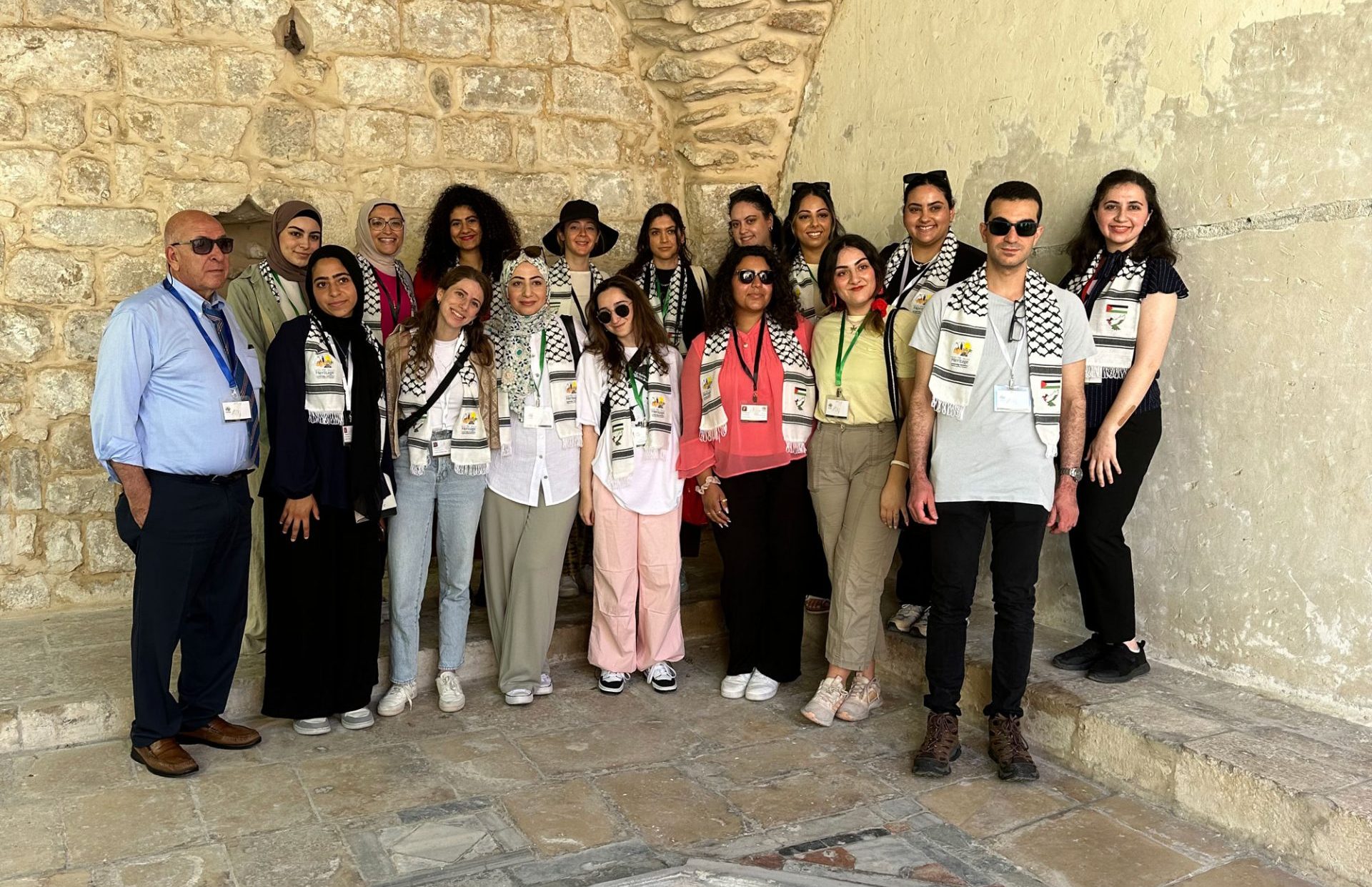KTH 2023 Delegation to Palestine Report
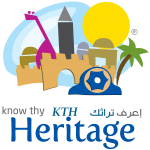
KTH 2023 Delegation to Palestine Report
July 27th – August 9, 2023
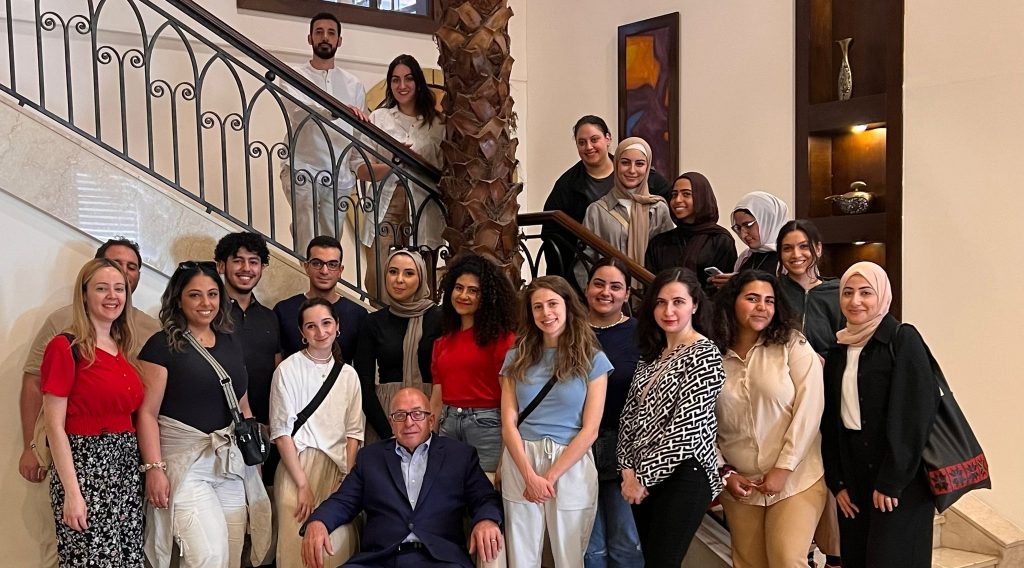
The KTH organization embarked on its 11th KTH 2023 Delegation to Palestine for two weeks. It was also the second Journey since the program was paused for COVID-19. The journey shows KTH has continued to rebound and grow since and was a great success. Each year a new delegation of Palestinian Diaspora travel from around the world to participate in Know Thy Heritage (KTH) Leadership program to “Explore and Serve Palestine.” This program helps the delegation get a real-life experience of their culture, history, traditions, learn their identity, and about Palestine’s economic, social, and political status. Landing in Jordan, they travel from there to Palestine where they meet Palestinians officials in Finance, Technology, and many other sectors where they find opportunities to contribute their unique skills.
This year, the journey had delegates from 6 countries who are of Palestinian descent, but most have not visited, experiencing Palestine for the first time instills in them a true connection to, and a love for their ancestral homeland, and the skills to advocate for and work towards its liberation, intertwining their destinies.
To read the full account of any day, click the title of any day to be redirected to the KTH website.
Day 1: Arriving, Meeting in Amman for the first time
They arrived in Amman, Jordan where they met and chatted briefly. As a group they represent the vibrant diversity of the Palestinian diaspora, spanning 4 continents. KTH founder, president and CEO Sir Rateb Rabie greeted them at the hotel, and they discussed the journey to get here and the journey that lay ahead of them. They had a traditional Palestinian dinner, said their goodbyes, and headed to bed for some much needed rest after an exhausting flight.
“Going on this trip made me realize the beauty and diversity of Palestine.”
Reem A., USA Delegate
Day 2: Orientation, exploring Amman, and Palestinian culture
The day of orientation began early, and many of them were jet-lagged from the journey to Jordan but still full of energy. They then headed to the venue where orientation took place. This was one of the most important parts of the entire journey, and the delegates who took the most away from it would be the most successful.
The group started with chatting among themselves, then they went into a more formal introduction. This was a deliberate practice meant to warm them up to public speaking as they honed their speaking and leadership skills as a whole. Sir Rateb Rabie laid out what the KTH Journey to Palestine entailed and the opportunities that lay ahead of them. Equally important, he told them how to look and behave when crossing the checkpoint from Jordan into Palestine, which was crucial for their safety, as well as being able to enter Palestine and make the journey in the first place.
Following the orientation, they took a brief tour of Amman, and attended an event at the Al Hannouneh Society for Popular Culture, is a remarkable institution in Jordan that celebrates and preserves the rich heritage of popular culture of Palestine. There, they were treated to a variety of authentic Palestinian customs and traditions, including food, the Zaffe (Palestinian wedding ceremony), and the folkloric Dabke dance. Delegates then returned to the hotel and prepared for the journey to Palestine the next day.
“The trip was an excellent opportunity to bond with the land and witness the occupation.”
Noor H. USA Delegate
Day 3: The Road to Palestine, First Encounter with Occupation
The delegates finally embarked on the journey to Palestine, the land that the ancestors of many delegates and alumni left nearly a century ago.
Upon arriving in Palestine, they were exposed to the process that they had been prepared and trained for. Israeli border security scanned their luggage and asked them questions such as where their family lived, how long they were staying, and the purpose of their journey.
They then walked out into the Palestinian city of Jericho, the world’s oldest continually inhabited city and UNESCO Heritage Site. They were greeted by dignitaries and handed custom-made KTH keffiyehs.
Next, they headed to Istiqlal University’s Palestinian Academy for Security Sciences, where they learned about the training of security, military, and police officers in Palestine. They had dinner and then embarked on a tour of the ancient Umayyad Hisham’s Palace. Finally, they rested and prepared for their first full day in Palestine.
“Through this journey we have learned, and now we will be able to act.”
Sophia K., USA Delegate
Day 4: Nablus, Cultural and Historic Heart of the West Bank
Delegates headed to the economic heart of the West Bank, Nablus, where four of them trace their roots. They toured the city, passing through its old markets and stopping to enjoy its famous kanafeh, as Nablus is the city of the dessert’s birth. During their visit, they had the opportunity to meet three of Nablus’s councilwomen and hear about their plans to continue the city’s development and improvement, including growing its tech sector. Women play a crucial role in the KTH Leadership Initiative, and emphasizing and fostering their increasing role in Palestinian society is a crucial part of their journey.
They also had the chance to learn about one of the oldest Palestinian communities: The Samaritans, a 3000+ year-old ethno-religion with less than 1000 people who live on Mount Gerizim, on the outskirts of Nablus. After this insightful visit, they returned home and prepared to explore Ramallah the next day.
“I really enjoyed being able to see so many different cities in Palestine in just 2 weeks.”
– Selena K., USA Delegate
Day 5: Roots of Resistance, and the Political State of Palestine
Delegates spent Day 5 Exploring Ramallah, the cultural and political capital of Palestine. They performed the national anthem of Palestine on TV and met many high level staff at the Palestinian Broadcasting Corporation. The day consisted of many formal visits with members of the Palestinian Government. Ambassador Hijazi gave an enriching account of Palestinian history and politics, followed by a meeting with the world famous Dr. Hanan Ashrawi, who gave a personal perspective on the political situation in Occupied Palestine. Lastly, Dr. Laila Ghannam, Governor of Ramallah, spoke to the delegates about challenges specifically facing Ramallah and its populace.
Following lunch, Delegates literally planted their roots in Palestine. They each worked in the heat planting olive trees, Palestine’s signature tree, poetically replacing ones that had been uprooted by Israeli Settlers. The Palestinian diaspora left their mark on the land and reconnected after being disconnected for so long.
Delegates then returned to Ramallah, visiting the headquarters of Sir Rateb Rabie’s organization, the Holy Land Ecunemnical Foundation (HCEF) where they practiced the Dabke, and a few delegates toured Sir Rateb’s office getting to see photos of previous delegations. At this point in the day, a delegate fell ill and was taken to a hospital, this exposed delegates to another fact of life in Palestine – poor healthcare infrastructure due to the Occupation. An unfortunate circumstance that lent a learning experience. Delegates returned to the hotel and prepared for Jerusalem the next day.
“To me, Palestinian heritage is more than just dance, music, and food, it’s resistance and resilience.”
-Ammar A, Australia Delegate
Day 6: Journey Through Jerusalem’s Divided Quarters
Delegates explored the Old City at Lion’s Gate, being at the mercy of Israeli soldiers’ for entry to Al Aqsa Compound—an injustice of the Occupation. Witnessing the Dome of The Rock’s beauty, they visited the damaged Al Aqsa compound, symbolizing historic religious legacies. Passing the Western Wall from a distance due to restrictions, they experienced daily Palestinian life in the souks amid ongoing colonization.
A visit to the Holy Sepulchre showcased religious history, and their guide’s house, under constant surveillance, highlighted the oppressive laws in occupied East Jerusalem. After meeting a Muslim leader, they bargained in city markets, noticing pro-Israel agendas from some guides, and Israeli guards at every Muslim holy site. Despite challenges, they remain committed to exposing injustice and achieving justice.
“This journey has truly inspired me and my fellow delegates to do everything we can to advocate for Palestine.”
Rami A., USA Delegate
Day 7: Bethlehem, the Birthplace of Jesus; the First Palestinian Refugee
Day 7 took place in Bethlehem, one of the holiest places in Christianity, known to contain the Church of the Nativity, where Jesus was born. KTH stresses the importance of visiting holy sites of both Christianity and Islam, emphasizing unity between the two main religions of Palestine. They saw the altar of Jesus in the underground portion of the Church, marking the exact site of his birth. Bethlehem and its neighboring towns are where most of the Palestinian diaspora in Latin America hail from, so it is both a religious and cultural experience to behold. They toured through the old city of Bethlehem and saw the city’s famous handicrafts like olive wood carvings, rosaries, and thobes. They ate at one of Bethlehem’s most iconic restaurants, Afteem, and dined on its famous falafel.
They then visited Aida Refugee Camp, one of the biggest in the West Bank. The camp has made remarkable strides in educating children and aiding in the resistance of the Occupation. They have multiple facilities dedicated to regular pedagogical education as well as cultural education of Palestine. The camp, like all other Palestinian refugee camps, advocates for the Right of Return. The camp shows the unbelievable resilience of their people despite a suffocating occupation.
Lastly, they visited Bethlehem University where they were introduced by Vice Chancellor Brother Peter, a veteran employee of the University, who spoke with them about the rewarding but challenging work he has done due to the occupation. They also heard from H.E. Bishop William Shomali, and 5 Palestinian students and their experiences living under occupation. Despite their experiences, their hopes and dreams are alive and well, and this is the ultimate tool against the occupation.
“This journey opens your eyes to the Palestinian reality and its struggles.”
-Nicole M., Honduras Delegate
Day 8: Hebron, A City Full of History
More than halfway through their journey, they spent the day in Hebron. Hebron is the West Bank’s largest city and one of its most historical and culturally significant. They first stopped at the Municipality to hear Tayseer Abu Sneineh, Mayor of Hebron, speak. Like many they’d heard from before, he talked about the Occupation as a whole and specifically underpinned it with the challenges unique to Hebron.
They then visited the Ibrahimi Mosque, holy to all Abrahamic religions due to its significance as the resting place of Abraham. People of many faiths have made the pilgrimage here over the centuries, and they have followed in their footsteps. They then went through the Old City, where they got to truly indulge in the many different cultures that have helped shape the city. They heard stories from local vendors, who were gracious enough to show them Hebron through their eyes.
Finally, they stopped at the Hebron Chamber of Commerce, undoubtedly an important place in the West Bank’s largest city and home to a few of its biggest industries. Leading them to their next visit, Hebron’s glass and ceramic factory. Hebron is particularly famous for its glass blowing, and its blue vases and ceramic plates dot the city, emphasizing its uniqueness.
“I got to see the generosity of the locals of Palestine, and that will definitely inspire me to come back again and again.”
-Melissa T., USA Delegate
Day 9: A Day of Preparation of the 10th Diaspora Conference and Enjoying the Dead Sea
Day 9 of the KTH 2023 program was filled with excitement as preparations were made for the 10th International Diaspora Conference at Arab American University Ramallah Branch. Dedicated delegates and volunteers worked tirelessly to set up the auditorium, including name tags, registration tables, microphones, and AV equipment. The conference aimed to connect the global Palestinian Diaspora with those living on their ancestral land. During a break, the team enjoyed traditional cheese manakish for lunch.
While some volunteers continued preparing the venue, others took a break to rest at their Ramallah hotel or explore the city. Afterward, some volunteers visited the Dead Sea, where they experienced the influence of Israeli culture but still found the charm of Arab and Palestinian elements in the surroundings.
At the Dead Sea, they floated effortlessly in the salty water and applied nourishing mud to their skin. After a few hours, they returned to the hotel, had dinner, and held a debriefing session in preparation for the upcoming conference.
“I’m very grateful to have met Palestinians from all over the world who share my goal to help and advocate for Palestine.”
-Heba S., Canada Delegate
Day 10: 10th Annual Palestinian Diaspora Conference
Day 10 centered around the 10th annual International Diaspora Conference, in the Arab American University – Ramallah branch. KTH is a key aspect of the conference, and delegates helped set up the venue to be used for the event. Hundreds of speakers from across Palestine and the diaspora spoke (including our own Sir Rateb) and together formed a unified voice for the Palestinian movement. Throughout the event, the delegates were hard at work moderating panels, taking pictures, and posting to social media, once again honing their leadership skills. They had the opportunity to speak and network with professionals, students, and entrepreneurs, allowing them to work towards another core part of the KTH mission; The role of the diaspora in building the State of Palestine.
“I look forward to returning to Palestine to cultivate the relationships I gained during the program.”
-Shahd K., Canada Delegate
Day 11: Akka At Last, And Haifa Too
After ten days of conferences and travel within the West Bank, delegates excitedly cross into the 1948 areas, especially for those with family ties to the region. Many delegates whose family originated from the 1948 areas shared Nakba stories. They woke up early and headed to Akka, the first destination. In Akka, a lively tour guide named Andrew explained the city’s history, its protective walls, and showed them an outdoor art exhibition by local artist Walid Ashash, as well as Al-Jazzar Mosque. After a two-and-a-half-hour tour, the group split up for lunch.
After lunch, delegates left Akka and headed to Haifa. In Haifa, they met with local leaders and academics at the Arab Culture Association to discuss the challenges facing the Palestinian community within the 1948 borders and the marginalization of those who left after 1948. Another tour guide, Mustafa, took them to the beach and spoke about a vibrant Arab Community that existed around it, until Israel razed it in 1948. They toured famous sites in Haifa, including the beach and the German Colony with a view of the Bahá’í Gardens.
After a long day of touring, they head to their hotel in Nazareth, where they had a delicious dinner and prepared for the adventures of the next day of the KTH journey.
“It was an amazing opportunity visiting all the different cities, especially Akka, where my family is from.”
Tarek I., New Zealand Delegate
Day 12: A Journey Through Palestine’s 1948
On Day 12 of the KTH Palestine journey, delegates explored Nazareth, Iqrit, and Yaffa, witnessing the architectural and natural beauty. In Nazareth, grand churches and the Basilica of Annunciation showcased cultural and religious significance. They marveled at depictions of the Virgin Mary, emphasizing universal devotion to Jesus Christ and Palestine’s role as the Holy Land.
In Iqrit, they learned about the town’s tragic history, where villagers lived peacefully until forced evacuation by the Israeli Defense Forces. Despite the hike to its barren mountaintop, they felt a deep connection to the resilient spirit of the Palestinian people.
Yaffa captivated them with its architectural charm, and an unusual sight of a coppery egg symbolized the resilience of Palestine. They also learned about the devastating loss of Yaffa’s orange farms, a symbol of the Palestinian way of life.
Meeting Palestinian politician and activist Sami Abu Shehadeh in Yaffa was enlightening. He defied their expectations, providing transparency and understanding of history and people’s behaviors.
Throughout the day, they confronted the harsh history of expulsion and colonization, highlighting the challenges and resilience of the Palestinian people in preserving their culture and heritage.
“KTH was a chance for me to connect with my Palestinian roots as well as the global Palestinian community.”
Romance B., USA Delegate
Day 13: Saying Goodbye to Ramallah
On their final day in Palestine, the group explored various aspects of Palestinian life and challenges, engaging with key speakers to understand different economic sectors. The day began with Dr. Nahed Habiballah discussing the complex issue of Palestinian identity, highlighting the struggles faced in navigating this, whether in Palestine or the diaspora.
At the Palestinian Ministry of Health, Dr. Mai Al-Kaila addressed healthcare challenges worsened by the occupation, emphasizing hindered access to medical care and supplies due to Israeli policies. The group also visited Palestine Techno Park, a startup hub fostering entrepreneurship and innovation, connecting businesses with international investors.
Meetings with business leaders Samir Hulileh and Sam Bahour focused on economic sectors and barriers in Palestine. Despite witnessing harsh living conditions, especially in healthcare and economic disparities, the group observed the resilience and determination of Palestinians to overcome obstacles.
Throughout the day, the importance of advocacy resonated, emphasizing the group’s role in raising awareness about the Palestinian situation. Despite challenges, Palestinians continue to pursue education, careers, and meaningful lives, showcasing unwavering spirit. This final day underscored the need to spread the word and advocate for the Palestinian cause, inspired by the determination and resilience observed during the journey.
“Through the program, I was able to gain new social, economic, and political perspectives on Palestine.”
Jenine I., USA Delegate
Day 14: Farewell to Palestine, For Now.
On the last day of our journey, we gathered one last time to reflect on our experiences and discuss our responsibilities to both Know Thy Heritage (KTH) and Palestine. We recognized that our two-week journey had taught us that there is always work to be done for the Palestinian cause.
We began by recording video testimonials, where each of us shared our overall experiences and takeaways from the journey. It was an invigorating process, with some of us needing multiple takes, and others expressing their thoughts in different languages. These testimonials allowed us to relive our memories, the knowledge gained, and the friendships formed in Palestine.
Next, our group leader, Reem E., introduced the new shadow board of directors and outlined their roles within KTH. With their guidance, we discussed our plans for giving back to KTH and Palestine once we returned to our homes. We shared inspiring ideas, including volunteering with nonprofits we encountered during the trip, engaging in social advocacy, organizing fundraisers in our communities, and using social media to raise awareness about the Palestinian cause.
After hearing everyone’s thoughts, we concluded the meeting and began our journey from Ramallah to Amman, where we would eventually disperse, taking with us the lessons, memories, and the determination to continue serving Palestine.
“KTH is a great opportunity to meet Palestinians leading Palestine, and from all over the world”
Serena H., USA Delegate
Conclusion
Know Thy Heritage (KTH) seeks to maintain and expand its impact on young diaspora Palestinians worldwide to help them connect, explore, and serve their homeland, Palestine. To date, KTH has successfully embedded over 450 delegates from 22 countries and five continents into our organization. For over twelve years, KTH has worked with these young professionals and developed their capacity to give back to the land they were denied the right to experience. Through the KTH Journey program, our organization took delegates to Palestine, where they experienced the current harsh conditions Palestinians are subject to and understood the pressing needs of an occupied Nation.
“One of the biggest advantages of KTH is the team that gets together here, and that’s what makes it such an amazing program.”
Antonia L., Chile Delegate
For more information and to support our Birthright initiative, please visit www.kthps.org
